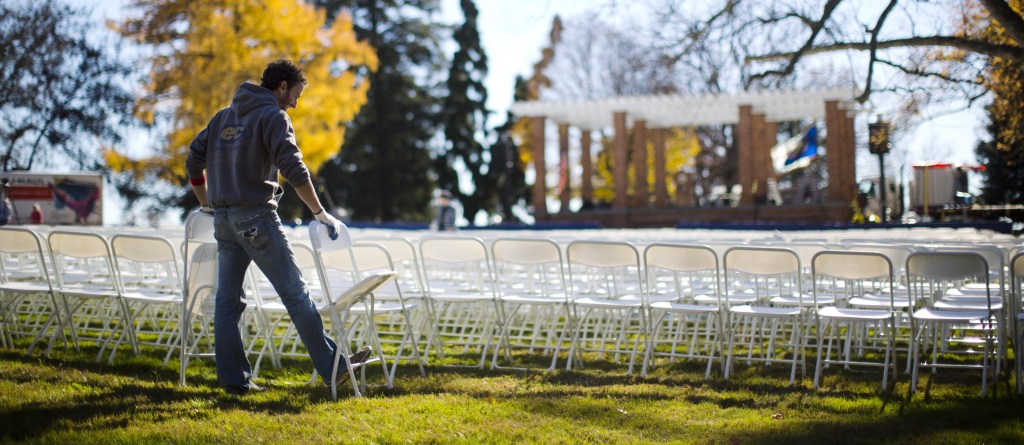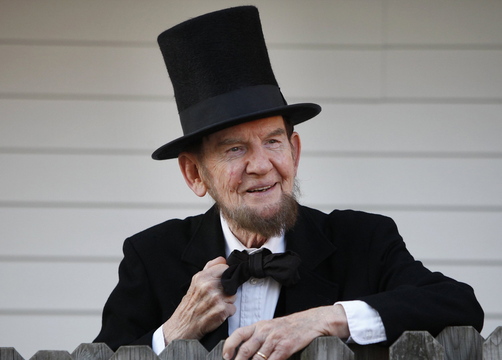GETTYSBURG, Pa. — When Jim Getty was growing up in Illinois, about 80 miles from President Abraham Lincoln’s tomb in Springfield, memorizing the Gettysburg Address was mandatory in most schools.
But it wasn’t until 1971, while working as a music teacher in Sandusky, Ohio, that Getty made use of that lesson and turned playing the 16th president into a career.
Someone pointed out he looked like Lincoln, so Getty grew a beard and started to moonlight in character for Rotary clubs. The night job turned into a full-time day job in 1977, when he packed up his family and moved to a Victorian house just down the hill from Soldiers’ National Cemetery in Gettysburg, where Lincoln delivered his famous speech on Nov. 19, 1863.
Since then Getty has been channeling Lincoln for presidents and foreign generals, schoolchildren, civic groups, even Hollywood cameras.
And while plenty of men wear the beard and top hat in parades and events nationwide, just one gives Lincoln’s most famous speech in the same place the president did.
When the nation marks the 150th anniversary of the event Tuesday, Getty will again be back on the podium near where Lincoln stood – as he has every fall for almost three decades – wearing his stovepipe hat, to bring the Gettysburg Address to life.
————————————————–
“Four score and seven years ago our fathers brought forth on this continent, a new nation …”
————————————————–
Getty, whose angular features and lanky build resemble Lincoln’s, says he has delivered the speech so many times he has lost count.
“I try to create a feeling with audiences that you really know the man by the research I’ve done,” he said, sitting earlier this month in his study in full Lincoln regalia, surrounded by wall-to-wall bookcases crammed with books on the president. “I am constantly amazed by how much he delved into in his life – from riding the circuit as a lawyer to his magnificent life in Washington.”
A century and a half earlier, Lincoln had traveled to this crossroads town, named for its founder, Samuel Gettys, to dedicate the final resting place for thousands of men killed in battle there four months earlier.
The carcasses of dead horses were still burning in the fields, and caskets with the bodies of dead soldiers lined the platform at the train station.
Lincoln had been invited to offer “a few appropriate remarks” at the event only weeks earlier.
As was the tradition at the time, the schedule for the ceremony was built around the keynote speaker, in this case the famed orator Edward Everett, who spoke for two hours.
The president delivered his 272-word speech in about two minutes before a weary crowd of thousands who crammed the torn-up hillside where grave digging was underway. Most of the people there would have been out of earshot.
————————————————–
“… Now we are engaged in a great civil war, testing whether that nation, or any nation so conceived and so dedicated, can long endure. …”
————————————————–
Lincoln’s remarks were trashed by some newspapers and ignored by others. But it was not long before the address caught hold, slipping into the nation’s consciousness.
“Great leaders give people something to dream about,” said Troy Harmon, a ranger and historian at Gettysburg National Military Park. “When Lincoln came to speak, it was a dark, desolate time of the war. There were 250,000 dead, people were depressed, lives destroyed. They looked to leaders to give them a vision, and that’s what he did.”
Getty talks about Lincoln’s wartime strategy – how he selected his generals – to address military groups. He tailors a different talk – examining how Lincoln assembled his Cabinet – to his appearances before civic and corporate groups.
“Lincoln offers leadership lessons no matter who you are,” Getty said.
Last year’s Dedication Day brought the largest audience, 10,000 people, to hear director Steven Spielberg after the release of his film “Lincoln.”
This year, the park service estimates 9,000 people will be on hand for the event, which will feature color guards, music and words to remember the sacrifices of the 3,564 Civil War dead buried there.
The National Park Service had invited President Obama, but he is sending Secretary of the Interior Sally Jewell in his place. She and Pulitzer Prize-winning historian James McPherson will share the keynote role.
And Getty will again don his hat and deliver these immortal words:
“… that this nation, under God, shall have a new birth of freedom –and that government of the people, by the people, for the people, shall not perish from the earth.”
Send questions/comments to the editors.




Success. Please wait for the page to reload. If the page does not reload within 5 seconds, please refresh the page.
Enter your email and password to access comments.
Hi, to comment on stories you must . This profile is in addition to your subscription and website login.
Already have a commenting profile? .
Invalid username/password.
Please check your email to confirm and complete your registration.
Only subscribers are eligible to post comments. Please subscribe or login first for digital access. Here’s why.
Use the form below to reset your password. When you've submitted your account email, we will send an email with a reset code.